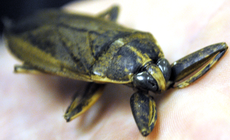Giant water bugs have recently been spotted in various parking lots on Nicholls campus.Earl Melancon, associate professor of biological sciences, said that the giant water bug is one of the largest insects in the U.S., with some as large as four inches.
Giant water bugs are ambush hunters that lie motionless and wait for their prey. These insects have jointed, sharp, sucking beaks and front legs that have been modified to hold and pinch prey as big as small fish, frogs and salamanders. Giant water bugs pierce their prey with their sharp beaks and secrete enzymes that dissolve the prey’s body tissues.
“Stay away from them, they will bite you,” Melancon said.
Gary LaFleur, associate professor of biological sciences, has a few water bug specimens. He said the giant water bug has been around Nicholls for a while, since the University is close to the insect’s habitat.
LaFleur said that although the insect spends most of its time in the water, it breathes air. The giant water bug will often come onto land because of its attraction to light.
“Sometimes the more beautiful and interesting things in life are the most common,” LaFleur said.
LaFleur said the water bug’s best weapon of defense is its ability to camouflage.
“It doesn’t really play dead,” LaFleur said. “It plays leaf.”
The giant water bug is not a serious danger to humans, but it is known to have a painful bite.
LaFleur said that though he has not been bitten, he believes that the bite can be comparable to a wasp or bee sting.
Brian Clausen, director of environmental health and safety, said that the University is treated for termites, roaches, fleas and other pests.
“We have to be careful what we use to keep students, faculty and staff safe, while also getting rid of the pests,” Clausen said.
Terry Dupre, director of purchasing, said that all food and residential areas on campus are treated at the beginning of each semester.
“We do our best to treat the required buildings,” Dupre said.
After those buildings have been treated, the University’s pest control is need-based. If a severe pest problem arises after the initial treatment, the University relies on Mike’s Termite & Pest Control, LLC.

Gary LaFleur, associate professor of biological sciences, looks at a dead giant water bug Monday in his Gouaux Hall laboratory. (Ashley Falterman)








